Switching to sugar-free products can significantly improve your overall health, especially if you’re trying to reduce your sugar intake, manage diabetes, or follow a low-carb diet. With so many options on the market, finding the right sugar-free products can be overwhelming. In this guide, we’ll explore some of the top-rated sugar-free products available, from snacks to beverages and sweeteners, to help you make better, healthier choices without sacrificing taste.https://mymealrecipes.com/low-carb-breakfast-recipes/
Types of Sugar-Free Products
When exploring the world of sugar-free products, you’ll quickly discover that there are many different options available to suit your dietary needs and preferences. These products cater to those who want to reduce their sugar intake for health reasons, such as managing diabetes or lowering their overall calorie consumption. Here are the most common types of sugar-free products you’ll encounter:
1. Sugar-Free Beverages
Sugar-sweetened beverages are one of the biggest sources of excess sugar in the diet. Thankfully, there are plenty of sugar-free alternatives on the market. These include sugar-free sodas, flavored waters, energy drinks, and teas. Most of these products use artificial or natural sweeteners like aspartame, stevia, or erythritol to provide sweetness without the added sugar. Crafting Diabetic-Friendly Recipes: A Culinary Art
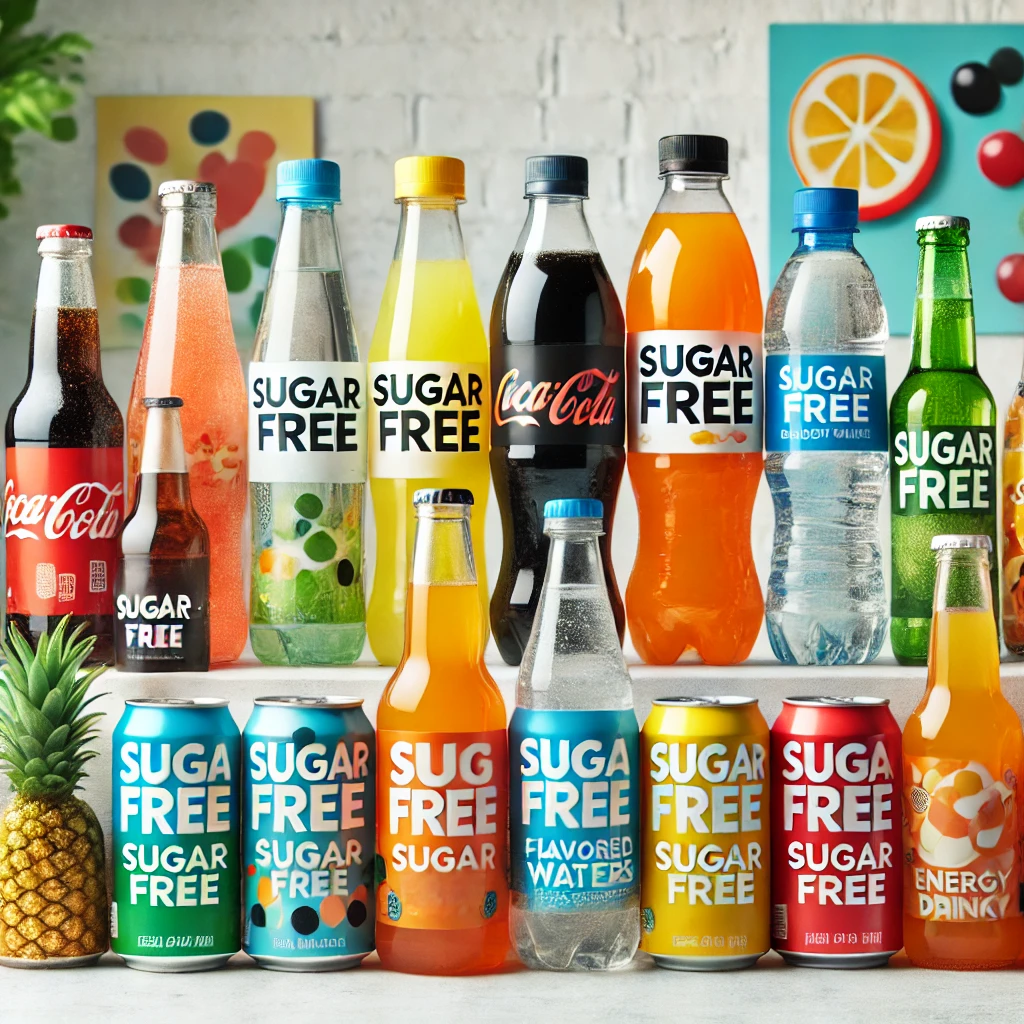
2. Sugar-Free Snacks
Snack time doesn’t have to mean sugar overload. From sugar-free cookies and candies to protein bars and crackers, there’s a wide variety of snack options that can help satisfy cravings without compromising your health. These snacks often use sugar substitutes like monk fruit or xylitol to maintain the sweetness, while also being low-carb and diabetic-friendly.
3. Sugar-Free Desserts
For those with a sweet tooth, sugar-free desserts offer a guilt-free way to indulge. Popular options include sugar-free cakes, ice creams, chocolates, and puddings. These desserts are typically made with sugar alternatives like erythritol, allulose, or stevia, providing the sweet taste you love without the blood sugar spikes.
4. Sugar-Free Sweeteners
Sugar-free sweeteners are a direct replacement for traditional sugar in cooking and baking. They are widely used in drinks like coffee and tea, and can be found in both artificial and natural forms. Popular sweeteners include stevia, monk fruit, sucralose, and erythritol. These alternatives provide the sweetness you’re used to, without the added calories or sugar content.
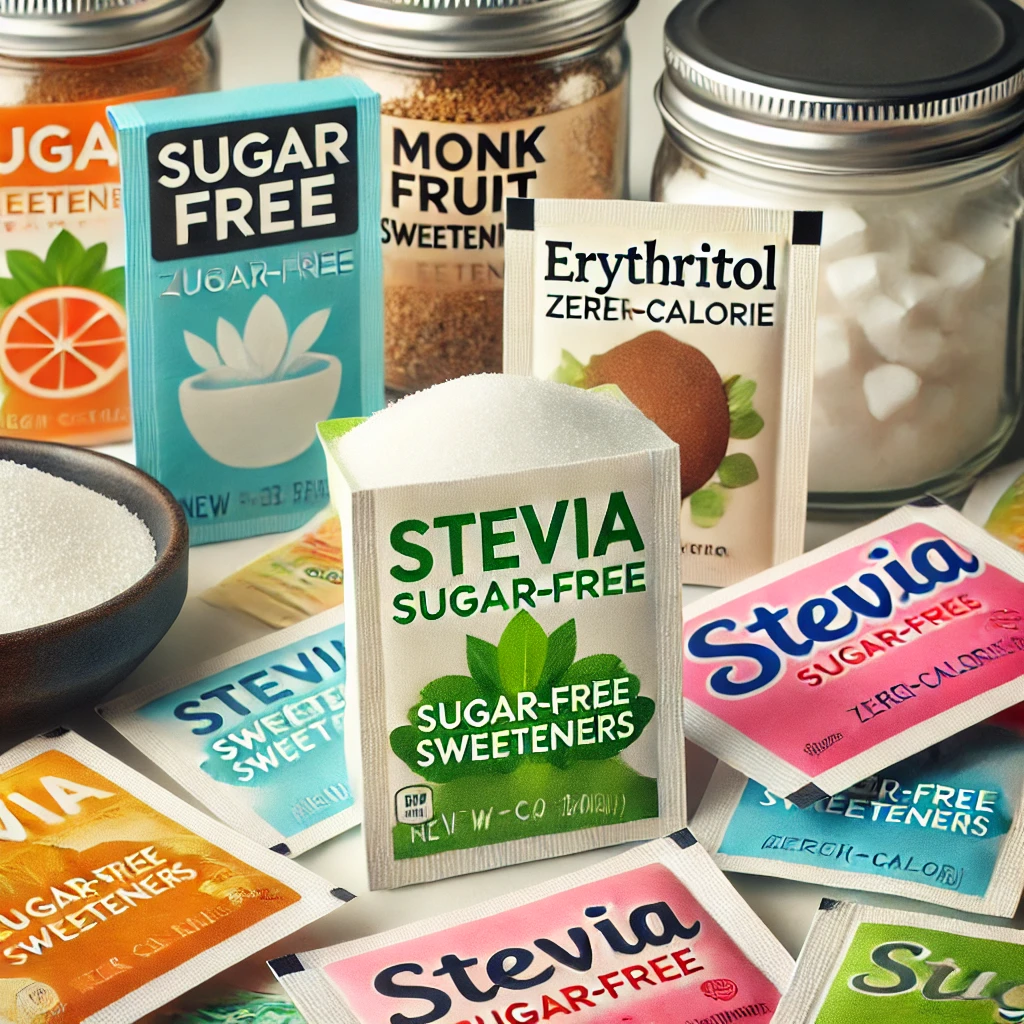
5. Sugar-Free Baking Products
If you love baking but want to cut out sugar, sugar-free baking products are a fantastic option. You can find sugar-free flours, chocolate chips, syrups, and more, allowing you to create your favorite baked goods without the negative effects of sugar. These products are perfect for diabetics or anyone following a low-carb or keto diet.
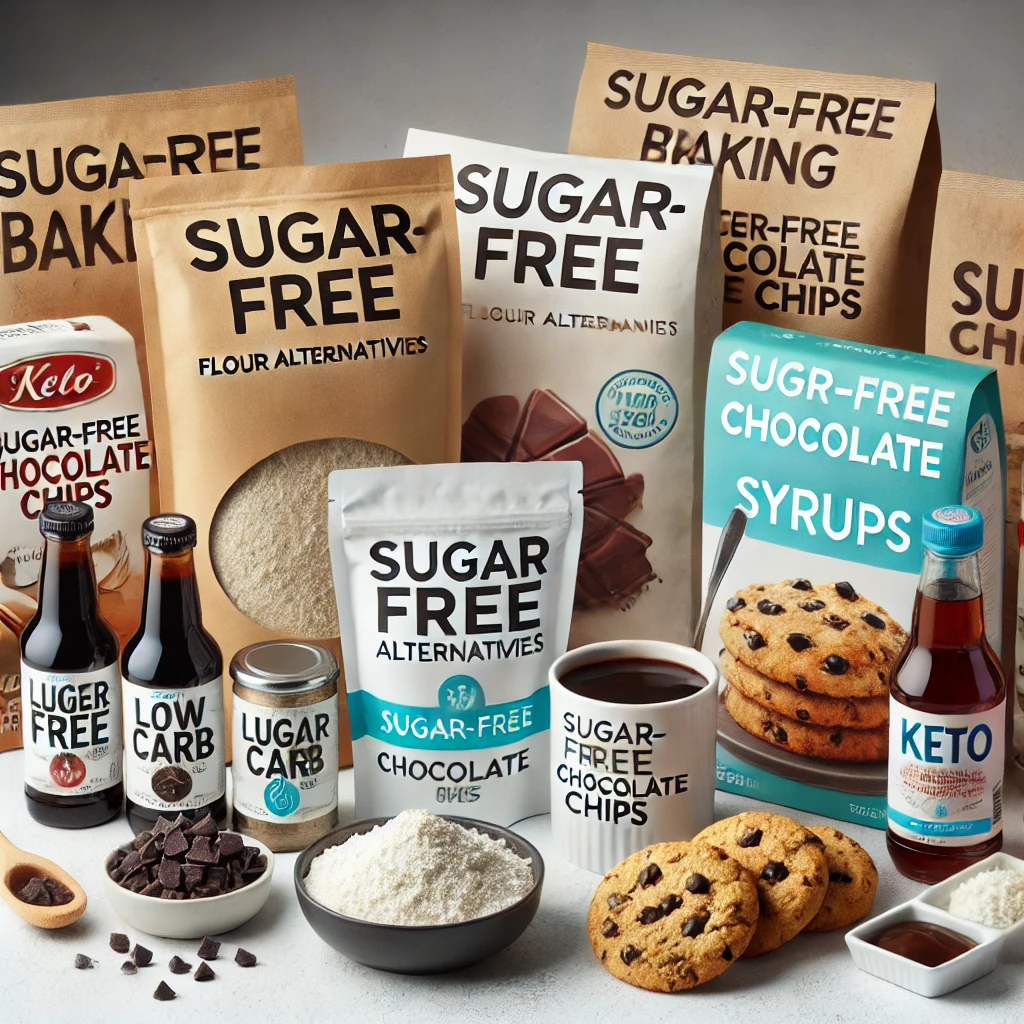
Health Benefits of Sugar-Free Products
Switching to sugar-free products offers many benefits, especially for those looking to improve their health. Whether you’re managing diabetes, aiming to reduce your calorie intake, or simply trying to avoid the negative effects of sugar, sugar-free alternatives can play a vital role in your diet. Below are some of the key health benefits of incorporating sugar-free products into your lifestyle:
1. Helps Manage Blood Sugar Levels
One of the most significant benefits of sugar-free products is their ability to help stabilize blood sugar levels. This is particularly important for individuals with diabetes who need to monitor their glucose levels closely. By avoiding sugar, you reduce the risk of sudden spikes in blood sugar, which can lead to complications such as fatigue, dizziness, and long-term health issues. Sugar-free sweeteners like stevia and erythritol are especially beneficial because they don’t raise blood glucose levels.
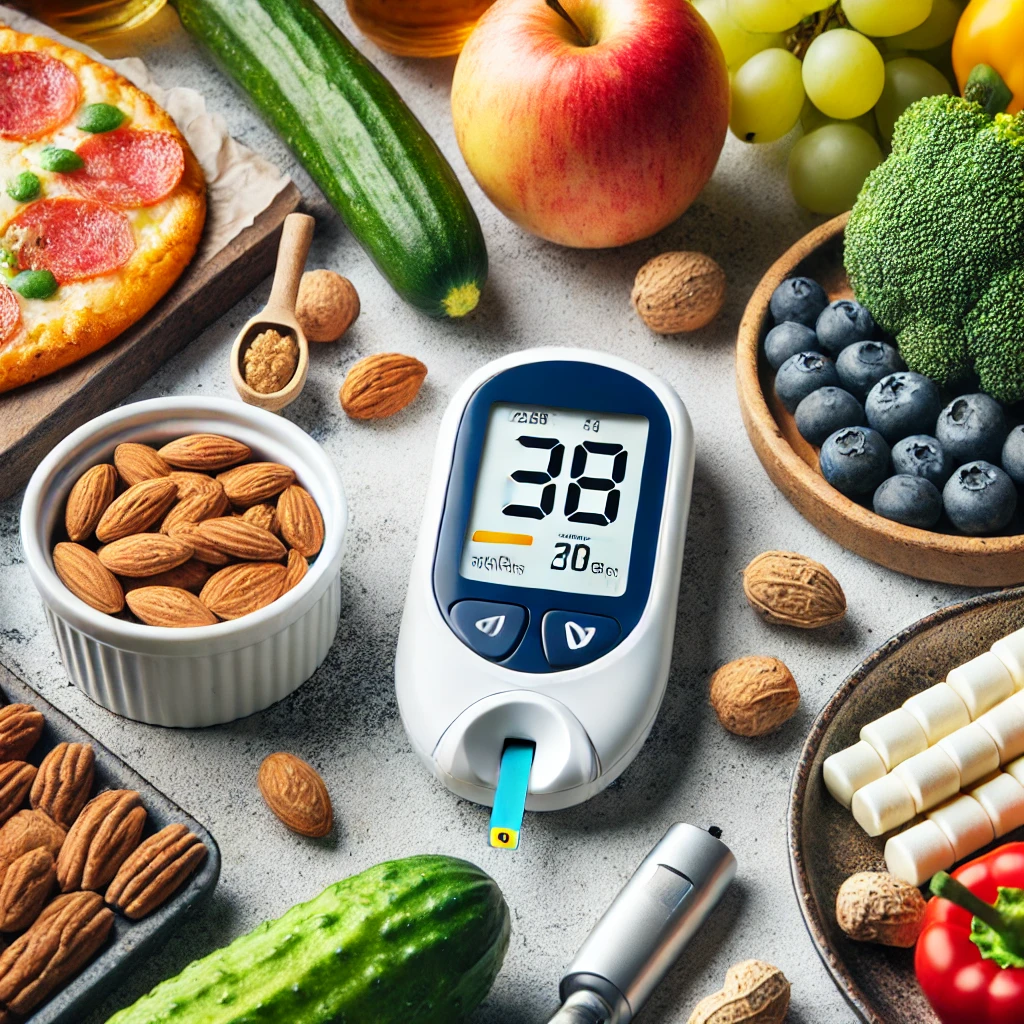
2. Supports Weight Loss and Weight Management
Excess sugar is often linked to weight gain because it adds extra calories without providing any essential nutrients. By choosing sugar-free products, you can reduce your overall calorie intake and support weight management efforts. Many sugar-free snacks, beverages, and desserts offer the same satisfying taste as their sugary counterparts but with fewer calories, making them ideal for those looking to lose or maintain weight.

3. Improves Dental Health
Sugary foods and drinks are a leading cause of tooth decay and cavities, especially in children. By switching to sugar-free alternatives, you can significantly reduce the risk of dental problems. Sugar-free gums, candies, and beverages provide a safer option for your teeth, as they don’t feed the harmful bacteria that cause plaque buildup and tooth decay. In fact, some sugar-free products, like those containing xylitol, can even help protect teeth by promoting saliva production.

4. Reduces the Risk of Chronic Diseases
High sugar intake is linked to a range of chronic conditions, including heart disease, type 2 diabetes, and obesity. Choosing sugar-free products helps to reduce these risks by lowering overall sugar consumption. By minimizing sugar in your diet, you can promote better heart health, reduce the likelihood of insulin resistance, and support overall metabolic health.
5. Provides More Stable Energy Levels
Foods high in sugar can lead to quick energy spikes followed by crashes, leaving you feeling tired and sluggish. Sugar-free products, on the other hand, offer a more stable source of energy. By avoiding sugar, you can prevent these energy dips and maintain better focus and alertness throughout the day. This is especially helpful for people managing their energy levels in work or school settings.
Taste and Quality of Sugar-Free Products
One of the most common concerns when switching to sugar-free products is whether they taste as good as their sugary counterparts. Over the years, the taste and quality of sugar-free alternatives have greatly improved, making them a fantastic option for people looking to reduce their sugar intake without compromising on flavor. Below, we’ll explore how the taste and quality of these products measure up, as well as the ingredients used to replicate sweetness in a healthier way.
1. Sweetness Without the Sugar
The biggest challenge for sugar-free products is delivering sweetness without using sugar. This is typically achieved through natural and artificial sweeteners like stevia, erythritol, and monk fruit. These sweeteners can provide the same level of sweetness as sugar but without the calories or negative effects on blood sugar. However, each sweetener has a unique flavor profile—some, like stevia, can have a slight aftertaste, while erythritol tastes very close to sugar but may have a cooling effect on the tongue.
2. Texture and Mouthfeel
Another important aspect of sugar-free products is their texture. In traditional products, sugar often plays a role in creating a smooth or creamy texture, as seen in baked goods, candies, and chocolates. In sugar-free products, companies use alternative ingredients like fiber or sugar alcohols to replicate that texture. While some consumers might notice a slight difference in mouthfeel—like a more granular texture in sugar-free chocolates—many people find these products to be satisfying and enjoyable once they get used to the differences.
3. Flavor Profiles
The flavor of sugar-free products can vary depending on the type of sweetener used. For example, products sweetened with stevia or monk fruit tend to have a slightly more natural taste, while artificial sweeteners like aspartame can taste similar to traditional sugar. Many sugar-free products are now made with flavor-enhancing ingredients, such as cocoa, vanilla, or fruit extracts, to enhance the taste and mask any aftertaste from the sweeteners. As a result, the flavor profiles of sugar-free products have come a long way and are now very close to their sugar-laden alternatives.
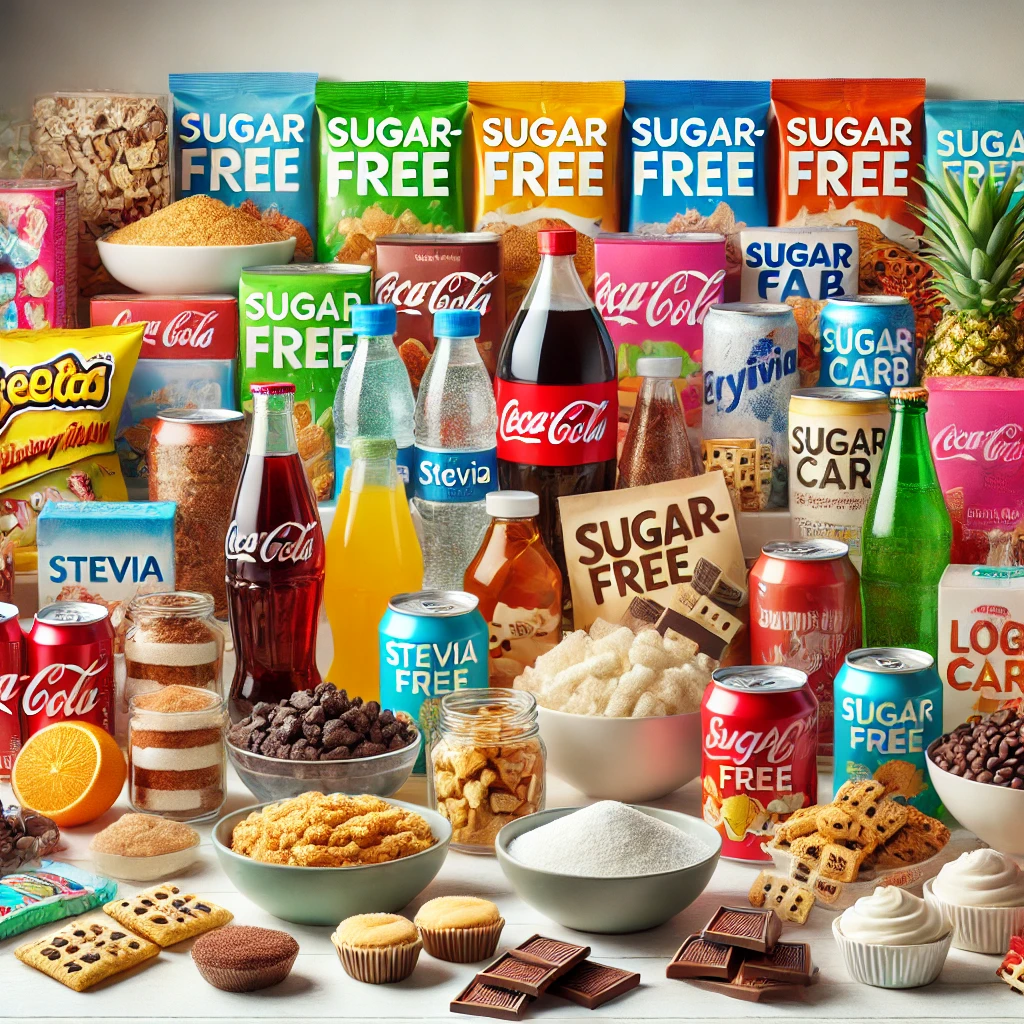
4. Improved Formulations Over Time
As demand for sugar-free products has grown, manufacturers have invested in improving their formulations. New technologies and ingredients have allowed companies to produce sugar-free versions of products that were once heavily reliant on sugar, such as candies, ice creams, and baked goods. These improved formulations mean that modern sugar-free products are closer than ever in taste and quality to their traditional counterparts.
5. Consumer Preferences
While the taste of sugar-free products may take some time to get used to for some, many consumers find that once they’ve made the switch, they don’t miss the sugar at all. With the growing variety of sugar-free options on the market, consumers can easily find products that suit their taste preferences, whether they prefer sweeteners like erythritol or monk fruit. Additionally, as people become more health-conscious, they are often willing to accept a slight difference in taste in exchange for the benefits of a sugar-free lifestyle.#https://mymealrecipes.com/wp-admin/post.php?post=796&action=edit#
Nutritional Comparison: Sugar-Free vs. Traditional Products
When it comes to choosing between sugar-free and traditional products, understanding the nutritional differences is key. Many people opt for sugar-free alternatives to reduce sugar intake, manage weight, or control blood sugar levels, but how do these products compare nutritionally? In this section, we’ll take a look at some key factors that differentiate sugar-free products from their traditional counterparts.
1. Calorie Content
One of the most noticeable differences between sugar-free and traditional products is their calorie content. Because sugar is high in calories, traditional snacks, beverages, and desserts often contain more calories than their sugar-free counterparts. For example, a regular soda can contain over 150 calories per can, while a sugar-free version typically has zero or very few calories. This makes sugar-free products a good option for people looking to reduce their overall calorie intake.
2. Carbohydrates and Sugar
Carbohydrate content is another significant difference between sugar-free and traditional products. Traditional products often contain high amounts of sugar, which increases their carbohydrate content. This can be problematic for people with diabetes or those on low-carb diets. Sugar-free products, on the other hand, replace sugar with low-carb sweeteners like stevia, erythritol, or sucralose, reducing the total carbohydrate content and making them a better option for managing blood sugar levels.
3. Artificial vs. Natural Sweeteners
Traditional products typically use refined sugars like sucrose, while sugar-free products rely on a range of artificial and natural sweeteners. Artificial sweeteners, such as aspartame and sucralose, are used to mimic the sweetness of sugar without adding calories or affecting blood sugar levels. Natural sweeteners, such as stevia and monk fruit, are also used in sugar-free products as healthier alternatives to sugar. While these sweeteners provide the sweetness consumers crave, it’s important to understand that each type of sweetener can affect taste and nutrition differently.
4. Fiber Content
Some sugar-free products may contain more fiber than their traditional counterparts. This is because fiber is sometimes used as a bulking agent in sugar-free baked goods and snacks. Fiber helps with digestion, promotes feelings of fullness, and slows the absorption of sugar into the bloodstream, making it especially beneficial for people with diabetes. Traditional products that contain sugar often lack this added fiber, making sugar-free alternatives a better choice nutritionally in this regard.
5. Added Ingredients and Preservatives
One thing to watch out for with both sugar-free and traditional products is the presence of added ingredients or preservatives. Sugar-free products may sometimes contain sugar alcohols, like maltitol or xylitol, which can cause digestive discomfort in some people if consumed in large amounts. On the other hand, traditional products often contain refined sugars and high-fructose corn syrup, both of which have been linked to health issues like obesity and diabetes. Reading the ingredient list is essential when comparing products to ensure you’re making the healthiest choice.
Best Sugar-Free Products on the Market
Finding the best sugar-free products can be overwhelming with so many options available today. Whether you’re looking for snacks, beverages, or baking ingredients, there’s a sugar-free alternative that suits your needs. In this section, we’ll cover some of the top-rated sugar-free products across different categories, making it easier for you to make informed choices.
1. Best Sugar-Free Sweeteners
Sweeteners are essential for those who want to reduce sugar without sacrificing sweetness. Some of the most popular sugar-free sweeteners on the market include:
- Stevia: A natural, plant-based sweetener that’s zero-calorie and does not raise blood sugar levels. It’s great for coffee, tea, and even baking.
- Erythritol: A sugar alcohol that tastes similar to sugar but contains fewer calories and doesn’t cause blood sugar spikes. It’s widely used in baked goods and desserts.
- Monk Fruit Sweetener: Another natural, zero-calorie sweetener, monk fruit is prized for its clean, sweet taste without any aftertaste.
These sweeteners are available in both powder and liquid forms, making them versatile for a range of uses.
2. Best Sugar-Free Snacks
When you’re craving a snack, sugar-free options allow you to enjoy a treat without the guilt. Here are some of the best sugar-free snacks on the market:
- Quest Nutrition Protein Bars: These bars are popular for being low in carbs and sugar-free, making them perfect for those on a keto or low-carb diet.
- Lily’s Sugar-Free Chocolate: Lily’s offers a range of chocolate products that use stevia instead of sugar. Their chocolates come in flavors like dark chocolate, milk chocolate, and salted caramel, perfect for satisfying your sweet tooth.
- SmartSweets Gummy Bears: A sugar-free take on the classic gummy bear, these candies are sweetened with stevia and are great for a low-sugar lifestyle.
These snacks provide convenience and taste without the added sugar, making them a staple for many health-conscious consumers.
Where to Add Image: Add an image of sugar-free snacks, such as chocolate bars and gummy bears, to give readers a visual representation of popular products.
3. Best Sugar-Free Beverages
If you’re looking for refreshing drinks that are free of sugar, there are plenty of great options. Some of the best sugar-free beverages include:
- Zevia Zero-Calorie Soda: Zevia offers a wide variety of soda flavors sweetened with stevia, making them a great alternative to traditional sugary sodas. With flavors like cola, ginger ale, and cream soda, you won’t miss the sugar at all.
- Bai Antioxidant Infusion: These fruity beverages are low in calories, sugar-free, and packed with antioxidants. They come in flavors like coconut, dragonfruit, and blueberry, offering both health benefits and great taste.
- LaCroix Sparkling Water: Known for its natural flavors and zero calories, LaCroix is a great option for those who want a fizzy drink without the sugar or artificial sweeteners.
These sugar-free beverages are perfect for quenching your thirst while sticking to a healthier lifestyle.
Where to Add Image: Add an image of sugar-free beverages like Zevia soda or Bai antioxidant drinks to visually support the variety of drink options.
4. Best Sugar-Free Desserts
Desserts don’t have to be off-limits when you’re cutting out sugar. Some of the best sugar-free desserts available include:
- Halo Top Ice Cream: Halo Top is a low-calorie, sugar-free ice cream that’s sweetened with stevia and erythritol. It comes in a wide variety of flavors, such as chocolate chip cookie dough and mint chip, and is a great alternative to traditional ice cream.
- Enlightened Keto Ice Cream: Another popular ice cream brand, Enlightened makes keto-friendly ice creams that are sugar-free and low in carbs. These are great for those following a keto or low-carb diet.
- Rebel Ice Cream: Rebel Ice Cream is sugar-free and has a creamy texture that rivals regular ice cream. It’s sweetened with erythritol and monk fruit, making it a satisfying dessert for people avoiding sugar.
These desserts allow you to indulge in a sweet treat without any of the guilt or blood sugar spikes.
Where to Add Image: Add an image showing sugar-free ice cream brands like Halo Top and Rebel to showcase the dessert options.
5. Best Sugar-Free Baking Ingredients
For those who love to bake, finding sugar-free baking ingredients is key to creating healthier versions of your favorite treats. Some of the best sugar-free baking ingredients on the market include:
- Lakanto Monk Fruit Sweetener: A popular sugar replacement in baking, Lakanto’s monk fruit sweetener bakes just like sugar and has no impact on blood sugar levels.
- Lily’s Chocolate Chips: These sugar-free chocolate chips are made with stevia and are perfect for baking cookies, brownies, or adding to any dessert.
- Swerve Sweetener: Swerve is a sugar substitute made from erythritol that measures cup-for-cup like sugar, making it ideal for baking. It’s a favorite among keto bakers.
With these sugar-free baking ingredients, you can make healthier versions of your favorite cookies, cakes, and breads.
Conclusion
Switching to sugar-free products doesn’t mean sacrificing flavor or enjoyment. From sweeteners to snacks, beverages, desserts, and baking ingredients, there are countless high-quality sugar-free options available today. These products not only help you reduce your sugar intake but also offer numerous health benefits such as better blood sugar management, weight control, and improved dental health.
Whether you’re managing diabetes, following a low-carb diet, or simply looking for healthier alternatives, the range of sugar-free products on the market ensures that you’ll find something that fits your lifestyle and tastes. By choosing wisely and incorporating these products into your daily routine, you can enjoy delicious, guilt-free meals and treats without worrying about the negative effects of sugar.
With this guide, you now have a comprehensive understanding of the best sugar-free options out there. Explore these products, try new recipes, and enjoy the benefits of living sugar-free!
links:
To explain sugar-free products and diabetes management, you can link to a trusted medical source like the Mayo Clinic.
For more information on sugar-free sweeteners, you can link to a page from a trusted health organization like the https://diabetes.org
Link to product reviews or recommendations from sites like https://www.healthline.com to give readers further reading on sugar alternatives.
